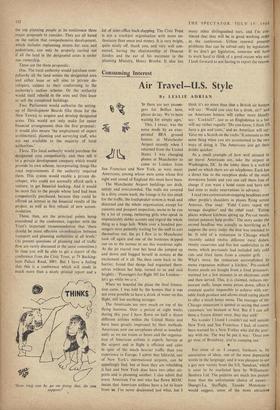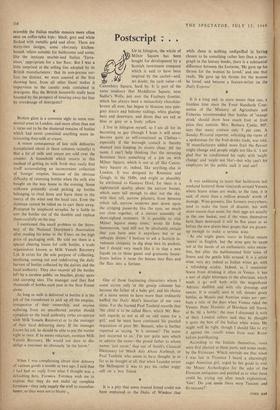Consuming Interest
Air Travel U.S. Style
By LESLIE ADRIAN 'IF there are any passen- gers for Belfast here, please do say. We've been waiting for simply ages.'
This, I swear, was the noise made by an exas- perated BEA ground hostess at Manchester Airport recently when I returned from the United States. I was changing planes at Manchester to come to London from San Francisco and New York, as were many Americans, among whom were some whose first sight and sound of England this must have been.
The Manchester Airport buildings are drab, untidy and overcrowded. The walls are covered in a dirty cream wash, the lounge is far too small for the traffic, the loudspeaker system is weak and distorted and the whole organisation, except for customs and passport inspection, seems to be run by a lot of young, twittering girls who speak in impenetrably debby accents and regard the whole thing as a huge lark. While over a hundred pas- sengers were patiently waiting for the staff to sort themselves out, the jet I flew in to Manchester took off again and one of the hostesses skipped out on to the tarmac to see this wondrous sight. As the jet roared over her head she jumped up and down and hugged herself in ecstasy at the excitement of it all. She, then came back to the barrier, found that things had organised them- selves without her help, turned to us and said brightly: 'Passengers for flight 583 for London— let's go while we cF n.'
When we boarded the plane the final frustra- tion came. I was told by the hostess that it was not even possible to have a drink of water on this flight, still less anything stronger.
The Americans are very much on top of the flying business. Over a period of eight weeks during this year I have flown on half a dozen different airlines within the United States and have been greatly impressed by their methods. Americans now use aeroplanes about as nonchal- antly as we use trains or buses and the organisa- tion of American airlines is superb. Service at the airport and in flight is efficient and calm in spite of the much heavier traffic than you experience in Europe. I admit that Idlewild, one of New York's international airports, can be appallingly bad, but at least they are rebuilding it fast and New York does have two other air- ports and is planning another. I also admit that every American I've met who has flown BOAC insists that American airlines have a lot to learn from us. I've never discovered just what, but I think it's no more than that a British air hostess will say: 'Would you care for a drink, sir?' and an American hostess will rather more bluntly say: 'Cocktail?', just as an Englishman in a bar will say rather vaguely: `Do you know, I think I'll have a gin and tonic,' and an American will say `Give me a Scotch on the rocks.' It amounts to the same thing when you are accustomed to the two ways of doing it. The Americans just get their drinks quicker.
As a small example of how well attuned to air travel Americans are, take the airport in Washington, DC. In the lobby there is a well-lit panel on which there are six telephones. Each has a direct line to the reception desks of the main downtown hotels and you can call them free of charge if you want a hotel room and have not had time to make reservations in advance.
I read two conversation-stopping headlines over other people's shoulders in planes flying across America. One read: 'Fidel Castro raped my teenage daughter' and the other read: 'Eating places without kitchens spring up. Pre-cut meats, instant potatoes help profits.' The story under the second headline was actually as horrifying as I suppose the story under the first was intended to be. It told of a restaurant in Chicago which 'recently added twelve different meat dishes, twenty' casseroles and five hot sandwiches to its menu, which previously had included only cold cuts and fried items from a counter grill. . . What's more, the restaurant accomplished its menu expansion without a kitchen.' Pre-cooked frozen meals are bought from a food processor, warmed for a few minutes in an electronic oven and then served. This, it is claimed, reduces res- taurant staffs, keeps menu prices down, offers a constant quality impossible to achieve with var- iable fresh produce and allows small eating places to offer a much better menu. The manager of the Chicago restaurant is quoted as saying that some customers 'are hesitant at first. But if I can sell them a frozen dinner once, they stay sold.'
No wonder I found I couldn't eat well outside New York and San Francisco. I had, of course, been warned by a New Yorker who did the jour- ney with me. The way he put it was: 'Once you go west of Broadway, you're camping out.'
For most of us 1 suspect, linoleum is, by association of ideas, one of the most depressing words in the language; and it was pleasant to see a gay new variety from the US, `Sandran,' which is soon to be marketed here by Williamson- Sandura Ltd. The patterns are much less preten- tious than the unfortunate choice of names- Shangri-La, Starflight, Tuxedo Monotone- would suggest; some of the more attractive resemble the Italian marble mosaics more often seen on coffee-tat:4e tops: black, grey and white flecked with metallic gold and silver. There are thirty-two designs, some obviously kitchen- bound, others suitable for bathrooms and some, like the intricate marble-ised Italian 'Terra- zinos,' appropriate for a bar floor. But I was a little surprised at the selling line adopted by its British manufacturers: that its non-porous sur- face (as distinct, we were assured at the first showing here, from all other linos) makes it impervious to the caustic soda contained in detergents. Has the British housewife really been haunted by the prospect of wearing away her lino by overdosage of detergents?
Broken glass is a common sight in some resi- dential areas in London, and more often than not it turns out to be the shattered remains of bottles which had never contained anything more in- toxicating than milk or cream.
A minor consequence of late milk deliveries (complained about in these columns recently) is that a lot of milk and cream are sold over the counter. A household which resorts to this method of getting its milk fresh may easily find itself accumulating an inconvenient collection of 'foreign' empties, because of the obvious difficulty of returning bottles when the milk Was bought on the way home in the evening. Some milkmen pointedly avoid picking up bottles belonging to rival firms and leave them to the mercy of the wind and the local cats. Even the dustman cannot be relied on to cart them away. Prompted by misplaced scruples, he is liable to sort the bottles out of the dustbin and replace them carefully on the step.
I mentioned this small problem to the Secre- tary of the National Dairymen's Association after reading his letter in the Times on the high price of packaging milk. He told me there is a special clearing house fot milk bottles, a trade organisation known as Milk Vessels Recovery Ltd. It exists for the sole purpose of collecting, sterilising, sorting out and redelivering. the daily harvest of bottles collected by the dairies and the local authority. They also recover all the bottles left by a careless public on beaches, picnic spots and camping sites. The manager said they find thousands of bottles each year in the New Forest alone.
As long as milk is delivered in bottles it is the job of the roundsman to pick up all the empties, irrespective of their ownership, and anyone suffering from an uncollected surplus should complain to the local authority (who co-operate with Milk Vessels Recovery) or to the manager of their local delivering dairy. If the manager knows his job, he should be able to put the matter right at once. If he seems reluctant, mention Milk Vessels Recovery. He would not dare to dis- oblige a customer to obviously 'in the know.'
*
When I was complaining about slow delivery of various goods a month or two ago, I said that I had had no reply from what I thought was a defaulting firm, Formica. Formica wish me to explain that they do not make up complete furniture—they only supply the stuff to manufac- turers; so they were not to blame t







































 Previous page
Previous page